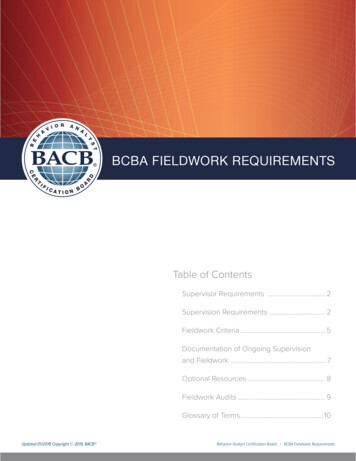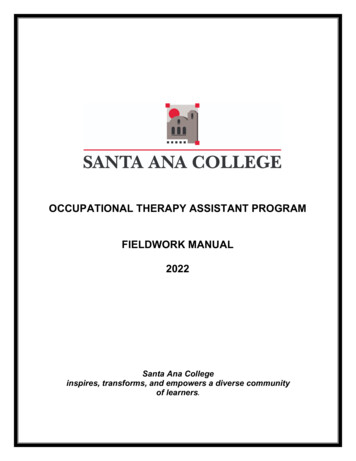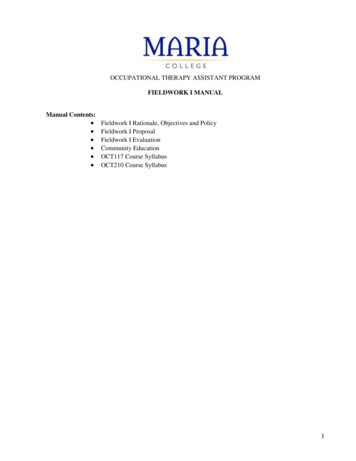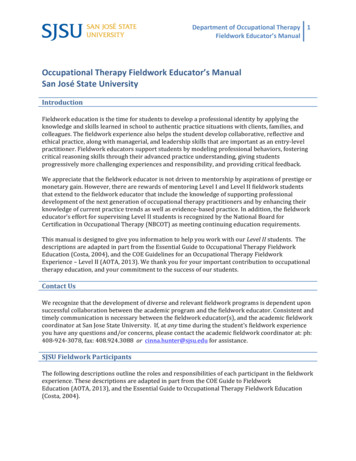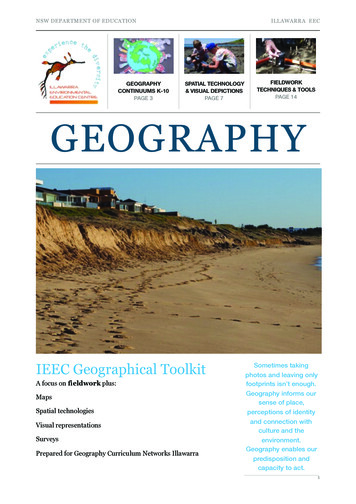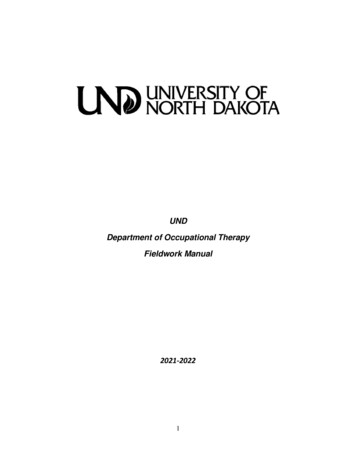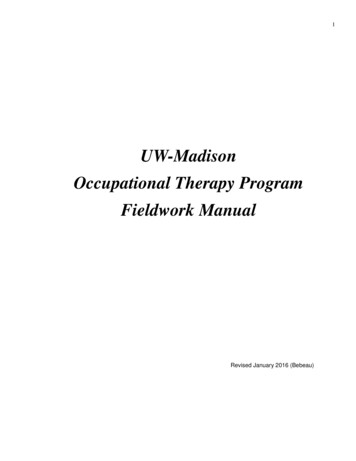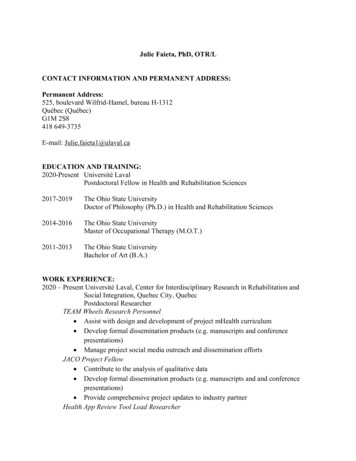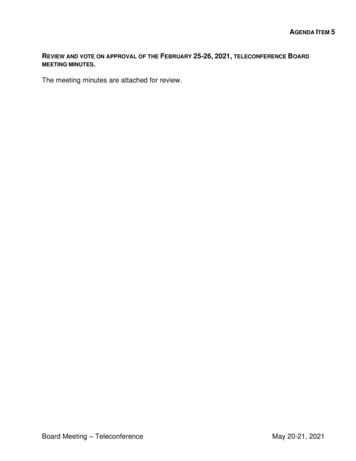
Transcription
EDUCATIONAL COUNSELING PROGRAMSTUDENT FIELDWORK HANDBOOKMaster of Science in Educational CounselingPupil Personnel Services Credential with a Specialization in School Counseling2019-2020(Updated 8/19/2019)
Welcome to Fieldwork. This handbook was designed to familiarize students in the EducationalCounseling Program with the program’s fieldwork expectations. The intent is to providestudents with information on course requirements, suggest ways to ensure reliablecommunication between students and their supervisors, and share information related toprofessional standards. Please take time to read the entire handbook before beginningfieldwork and keep it as a reference.The California Commission on Teacher Credentialing (CCTC) and the National Council forAccreditation of Teacher Educators (NCATE) accredited the Educational Counseling Program.Our carefully structured field-based component was designed to meet accreditation standards.Fieldwork provides students with an opportunity to practice the skills they need to perform as anentry-level school counselor.As the Director of Educational Counseling Fieldwork, I work with the Program Director,Lead Regional Faculty, and fieldwork course instructors (University Supervisor) to upholdaccreditation standards and oversee the efficacy of delivery. Your University Faculty Supervisorwill be the primary contact for fieldwork questions and placement. Students will begin fieldworkafter completing the foundation coursework and embedded practicum. Students will meetregularly with their University Faculty Supervisor throughout the time they are in fieldwork. Thepurpose of these meetings is to provide supervision and mentorship as they step into their newprofessional role. After reading the handbook, students will additional questions can contacttheir course faculty instructor or Lead Regional Faculty for assistance.Sincerely,Kathy Elderson, Ed.D.Director, Educational Counseling Fieldwork and Internship Credential Programkelderson@laverne.eduThe Educational Counseling Fieldwork Director reserves the right to modify the handbookbased on program requirements.1
Table of ContentsWelcome to Fieldwork . 1Educational Counseling Program Options . 3LFCE Core Dispositions & Values . 4Cultural Competence . 5Fieldwork Learning Outcomes . 5Ethical Standards. 7Professional Organization Membership . 7Liability Insurance Requirements . 7Mandated Reporter Requirement . 7Fieldwork Prerequisites . 8Fieldwork Competency Evaluation . 9Fieldwork Expectations For All Students . 9Site Selection & Placement Process. 10Fieldwork Hours Based on Program Options . 10Master of Science in Educational Counseling . 11Social Justice in Higher Education . 11PPS. 12Spanish Bilingual Bicultural Counseling . 13School and Family Based Counseling . 14Grading Policy . 14Regional Campuses . 14Main Campus . 14Fieldwork Registration Procedures . 15Cancellation of Fieldwork . 16Fieldwork Hours at the Candidate’s Place of Employment . 16Accruing Hours While Transitioning Between Fieldwork Courses orBetween Semesters/Terms . 17Fieldwork Forms. 19Submitting Fieldwork Forms for Course Credit . 19Meeting CCTC School Counseling Standards . 20Internship Credential Program . 21Credentialing Process. 21Application for Advanced Standing & Graduation . 22The Fieldwork Director reserves the right to modify the handbook based on program requirements.2
EDUCATIONAL COUNSELING PROGRAM OPTIONSPROGRAM OVERVIEWThe Master of Science in Educational Counseling develops academically well prepared, ethical,competent, and responsive practitioners. These practitioners are leaders and advocates thatstrive to create environments in education and the broader community supporting culturalresponsiveness academic achievement. Educational counselors work to promote social justice.They embrace a holistic approach to maximize the learning environment so all students canexperience success in the academic, college/career readiness and social/emotional domains.FEATURESCoursework within the program will equip candidates with the skills required to address schoolclimate and mental health concerns. Specifically, candidates will learn about culturally-relevantprevention and intervention practices that contribute to increased academic achievement forall students. Candidates will complete 46 units to earn a Masters Degree in Counseling or 48units to complete a Masters Degree in Counseling with a Pupil Personnel Services Credential.Candidates also have the option to customize the program to meet their professional goals byselecting a concentration in Spanish Bilingual Bicultural Counseling (SBBC), School and FamilyBased Counseling (SFBC/Licensed Professional Clinical Counselor) or Social Justice HigherEducation (SJHE) Administration. Courses are programmed late afternoon, evenings, and someweekends to meet the schedules of working students.School Counseling MS/PPS (48 units)MS/PPS credential equips candidates to work in the PK-12 education system.Spanish Bilingual Bicultural Concentration (9 units)This concentration is for individuals who are interested in working with Latinx students inCalifornia’s schools. Candidates engage in a unique experience with an emphasis on counselingstudents and their families who are Spanish speakers.Social Justice in Higher Education Administration (12 units)Designed for individuals interested in working in higher education, at two or four-yearinstitutions. Concentration content includes counseling for diverse populations, groupdynamics, high-impact practices, advisement and appraisal, and social justice advocacy.School Family-Based Concentration (12 units)This concentration is designed to prepare candidates for working in schools as well as in clinicalsettings. Coursework includes in-depth training in issues related to educational and clinicalcounseling. This concentration provides students with the necessary coursework to prepare forthe LPCC licensure exams and to seek out supervision for 3,000 hours of post-degreeprofessional experience.3
LA FETRA COLLEGE OF EDUCATIONCore Dispositions and ValuesThe LaFetra College of Education’s Professional Dispositions includes values, actions, attitudes,and beliefs that influence behaviors toward students, families, colleagues, and communitymembers. Professional dispositions affect student learning, motivation, and development, aswell as the educational counselor’s professional growth. Educational counselors mustdemonstrate dispositions that embody a commitment to professional principles and behaviorsthat facilitate student learning and convey a positive image of the education profession.Professional dispositions are a vital element of educational counselor preparation and expectedof all educators in the LaFetra College of Education. The Professional Dispositions identified areembedded in the educational counseling program curricula, as well as modeled and encouragedby faculty. Educational counseling candidates will develop and demonstrate professionaldispositions based on observable and measurable behaviors at various stages in the program.The Professional Dispositions expected of educational counseling candidates include:Intellectual & Personal Transformation Recognizing the limitations of a mono-worldview; striving for enhanced identity andperspective that is shaped and changed by people, knowledge, and experiences.Cultural Competence & Inclusion Transforming to an ideological perspective that influences professional identity; movingfrom a deficit perspective to one that skillfully and respectfully uses cultural referents toimpart academic content and competences.Social-Emotional Learning Emphasizing the importance of adult and child learning to accurately recognize feelings,interests, values, and strengths of self and others. Adults model this awareness byvalidating others’ feelings and helping them explore options to navigate socialsituations. Use of self-management to demonstrate the ability to successfully regulateemotions, thoughts, and behaviors in different situations.Ethically Responsible Decision- Making Developing a personal and professional values system that incorporates integrity,honesty, and confidentiality; discerning the needs of others and using relevantinformation, skills, and abilities to manage routine and challenging situations.Facilitation & Collaboration Embracing an attitude of humility. Knowing that we need others for self-improvementand utilizing a diverse team to extend beyond the individual. Using collaboration toexplore opportunities for being of service and receiving assistance. Practicing facilitationas a way of encouraging and engaging others, and self, in collaboration.4
Critical Analysis & Inquiry Using critical analysis and inquiry in the exploration of issues, ideas, artifacts, and eventsbefore accepting or formulating an opinion or conclusion. Constructing new informationand processes grounded in information literacy and the scientific method that supportevidenced-based conclusions and judgments.Innovative Thinking Using innovative, creative, and divergent thinking to address challenging situations,complete tasks, and solve problems. Synthesizing current ideas, with the addition offresh perspectives, unorthodox approaches, and the generation of novel solutions.Effective Verbal & Non- Verbal Expression Distinguishing between different forms and styles of expression based on the audience,message, and context for verbal and non-verbal communication. Initiating effectivecommunication that includes allocentric focus, logical organization, grammar and syntaxmastery, agility in switching between styles, active listening, and pursuit of feedback.CULTURAL COMPETENCESince the demographics of California public schools are continually changing, it is the policy ofthe School Counselor Preparation Program that socio-cultural competence be appropriatelyaddressed in all courses. Socio-cultural competence is defined as involving counselor trainees inthe continual development of attitudes/beliefs, knowledge, and skills related to: (a) awarenessof one’s own assumptions, values, and biases; (b) understanding the worldview of the culturallydifferent client; (c) culturally appropriate intervention strategies and techniques; and (d)sociopolitical influences that impinge upon the life of racial/ethnic minorities [based on Sue(2000)].FIELDWORK LEARNING OUTCOMES1. Become familiar with, and practice, the day-to-day service delivery skills and proceduresused by counselors in the field, especially in a multi-cultural environment.2. Demonstrate socio-cultural competence by: (a) acceptance and respect for differences; (b)ongoing assessment of one’s own and the organizations’ culture; (c) attention to thedynamics of difference; (d) continuous expansion of socio- cultural knowledge andresources; (e) using culturally appropriate intervention strategies; and/or (f) the adaptationof one’s values and behaviors.3. Develop, practice, and demonstrate personal values, attitudes, and behaviors, whichpromote the healthy personal and social development of children and adolescents.4. Identify and achieve personal learning activities, which contribute to professional growthand competency.5. Demonstrate the ability to use communication skills to facilitate pupils’ efforts to developpositive, supportive relationships with teachers and peers.6. Identify and practice strategies for effective problem solving and conflict managementwithin the school site/district.5
7. Gain insight into career counseling and the significance it has in schools.8. Design, implement and evaluate prevention and early intervention programs and strategiesfor working with students, parents, and guardians.9. Apply knowledge of assessments to the coordination of courses and programs, whichpromote individual achievement, paying particular attention to the counselor’s role inadvocating for student success.10. Demonstrate an ability to identify learning problems early and develop effective preventionand intervention strategies within a variety of school, community, and family environments.11. Apply knowledge and skills in prevention education.12. Explore the role of assessment in the functions of a school counselor.13. Demonstrate skills in working with parents and families from diverse backgrounds.14. Demonstrate skills in organizing and implementing in-service education programs for schoolstaff focused on the issues related to counseling and guidance.15. Develop and demonstrate the ability to work effectively and professionally with otherschool staff, parents, community members, and other groups to carry out the mission of theschool site/district.16. Demonstrate familiarity with the current literature and practices regarding administrative,behavioral, clinical, and professional growth and development supervision and mentoringmodels in preparation for future roles as supervisors.17. Gain appreciation for the vital role that site supervisors play in the professional training ofcandidates in a school counselor preparation program.18. Solicit professional feedback on performance from supervisors and co-workers, andrespond constructively to suggestions for improvement and growth.19. Explore the importance of School Safety and Violence Prevention20. Apply classroom learning in carrying out the responsibilities of a credentialed schoolcounselor.21. Develop and demonstrate competence in required experience/skill areas necessary for thedelivery of professional school counseling services: advocacy, educational assessment, dataand information systems on student learning and achievement, personal and socialcounseling, educational counseling, career counseling and guidance, information oncolleges and universities, use of technologies for student learning and achievement,consultation, collaboration, school and district policies and regulations, and legal and ethicalissues.22. Demonstrate and document, with the assistance of the University Supervisor of Field WorkExperience and Site Level Supervisors, the professional standards for the Pupil PersonnelServices Credential required by the California Commission on Teacher Credentialing.23. Plan, organize, and implement programs or groups such as conflict management, decisionmaking, and problem-solving, and/or peacekeeping which enables students to acquireattitudes and interpersonal skills that help them understand and respect themselves andothers, make decisions, set short and long-term goals and take necessary action to achievegoals, and to understand and develop safety and survival skills.6
ETHICAL STANDARDS FOR SCHOOL COUNSELORSCommitment to ethical principles and the capacity to engage in ethical decision-makingprocesses are hallmarks of professionalism. All Educational Counseling Program candidates arerequired to be familiar with and conduct themselves according to the ethical standards of theAmerican School Counselor Association (ASCA) and other professional associations applicableto the candidate’s field site.PROFESSIONAL ORGANIZATION MEMBERSHIPProfessional membership is important and provides many benefits. It establishes your identitywithin a professional field of study and facilitates professional development throughworkshops, seminars, conferences, and professional publications. Membership in a professionalorganization provides opportunities to network and stay abreast of changes and trends.There are several professional associations appropriate for master’s level school counselingtrainees. School counselor trainees are encouraged to join state and national organizations thatdirectly support and advocate for school counseling. These include the California Association ofSchool Counselors (CASC) http://www.schoolcounselor-ca.org/, and the American SchoolCounselor Association (ASCA) http://www.schoolcounselor.org/Discounted student rates are available in most associations.LIABILITY INSURANCE REQUIREMENTSAll school counselor trainees must maintain a professional liability insurance policy throughoutfieldwork and internship experiences. Evidence of liability coverage appropriate to theprofessional setting must be presented to your University Faculty Supervisor before you beginwork at your selected site. The insurance coverage you select is dependent on the settingwhere you will work. Therefore, when purchasing a policy, candidates must designate theirprofessional role (school counselor or licensed professional clinical counselor). School counselortrainees working in multiple settings must provide “Evidence of Insurance” for each setting.Insurance is available through a variety of organizations, including those listed below. Manyorganizations provide discounted students rates for membership and insurance.ASCA (American School Counselor Association) – offers professional liability insurance throughInternational TIE (Trust for Insuring Educators) as a benefit ofmembership. http://www.schoolcounselor.org/MANDATED REPORTER REQUIREMENTAll school counselor trainees must present a Child Abuse Mandated Reporter Trainingcertificate to their University Faculty Supervisor before they begin work at their selected site.7
The certificate is issued after completing the online training module and exam for schoolpersonnel. The training is located on the website: http://educators.mandatedreporterca.com/Students will be required to present the certificate in courses throughout the program.FIELDWORK PREREQUISITES(FOUNDATION COURSEWORK & PRACTICUM)The Educational Counseling Program is structured sequentially to provide essential contentknowledge for school counselors before beginning fieldwork. In the first year of the program,candidates complete one hundred (100) hours of practicum. The practicum hours areintegrated into four (4) foundation courses, twenty-five (25) hours of practicum activities percourse:Education 546—Introduction to School CounselingEducation 549—School Counseling TheoriesEducation 571—Individual Counseling SkillsEducation 572—Group Counseling Skills.Requirements for the practicum experience include, but not limited to the following:“shadowing” a school counselor; visiting school counseling centers; participating in peercounseling; visiting school-based programs serving parents and family members; renderingcommunity service for children and families; observing classroom instruction; attending local,state, national, or international meetings and conferences relating to school counseling andother appropriate topics; and mapping school-based community resources in counseling.School counselor trainees must complete all foundation coursework with a B or better beforeenrolling in Supervised Fieldwork.FIELDWORK PREREQUISITES (CONT.)In addition to coursework and practicum requirements, candidates must meet the followingrequirements before they can be placed at a pre-approved fieldwork site.California Basic Educational Skills Test (CBEST)Students that are interested in pursuing the PPS Credential MUST pass all sections of the CBEST.Admission to the PPS Credential Program is a requirement for registration in PPS 583C or PPS584. School counselor trainees are required to pass all sections of CBEST before a PPScredential can be issued. School counselor trainees must pass all sections of CBEST before registering in PPS 583Cor PPS 584. School counselor trainees pursuing the MS in Educational Counseling without the PPSdo not need the CBEST.8
Certificate of Clearance School counselor trainees are required to have a valid Certificate of Clearance orCalifornia Teaching Credential before admission to the Educational CounselingProgram. The Certificate of Clearance must be current while enrolled in fieldwork.Tuberculosis Clearance School counselor trainees are required to have TB clearance before admission to theEducational Counseling Program. Students must maintain clear TB results throughoutfieldwork.FIELDWORK COMPETENCY EVALUATIONSupervised field experience is central to the training of school counselors at every stage oftheir development. Carefully structured and supervised experiences in schools and otherappropriate settings allow candidates to observe experienced practitioners, practice initialskill development, and become oriented to schools and the community. Field experience isalso the primary means through which supervisors and more experienced mentors candeliver immediate and direct feedback, essential to the development of professional skillsand competence (CCTC, 2000). Evaluations are located on the Student Fieldwork Resourceswebsite: -resources/FIELDWORK EXPECTATIONS FOR ALL STUDENTSAll master's level school counselor trainees will complete PPS 583A: Supervised Fieldwork—Level I (200 hours); and, PPS 583B: Supervised Fieldwork—Level II (200 hours). Schoolcounselor trainees pursuing the PPS credential must also complete PPS 583C: SupervisedFieldwork—Level III (200 hours) or PPS 584: Clinical Practicum (200 hours) for a total of 600hours of fieldwork.1. School counselor trainees will complete a minimum of 200 hours at each approvedplacement site during the school day.2. School counselor trainee’s placement sites must be selected from the list of preapproved sites provided by the Fieldwork Director.3. School counselor trainees will collect hours from one (1) site at a time.4. School counselor trainees will spend a minimum of fifteen (15) hours to a maximum ofthirty (30) hours per week on-site to complete 600 hours within the projected programsequence.i. It is important to remember that fieldwork occurs in schools during school hoursand the extent to which you can work and satisfy fieldwork requirementsdepend on the degree of flexibility in your outside commitments.ii. You are in the best position to make this determination. Your University FacultySupervisor is available to assist you as you think through your situation.5. School counselor trainees may participate in sanctioned night and weekend activitieslisted on their objective form and aligned with school counseling program goals. Nightand weekend activities may not exceed 10 hours for each placement site.9
6. School counselor trainees may not begin accruing hours before submitting anApplication for Fieldwork Placement and receiving approval from the appropriateuniversity designee. The earliest a school counselor trainee can begin accruing hours for583A is the first day of the semester/term in which they attend class.7. Before starting work at an approved site, the school counselor trainees will completeand submit the following:i. A Fieldwork Site Agreement, and professional liability insurance that covers theentire period the school counselor trainee is working at the approved site8. School counselor trainees will complete Fieldwork Objectives for each placement sitewithin the first two weeks at the approved site.9. School counselor trainees will coordinate and participate in a site visit. The UniversityFaculty Supervisor and Site Supervisor will discuss the school counselor trainee'sprogress.10. School counselor trainees will complete Fieldwork Weekly Activity Logs that haveenough detail that they can recall what activities was completed and with whom, butwill not use personally identifiable student information.11. School counselor trainees currently employed by the potential fieldwork site mustarrange release time with their site administrator. They must be able to perform theduties of a masters level school counselor, and these duties must be outside the scopeof their current job responsibilities. Please refer to FIELDWORK HOURS ATCANDIDATE’S PLACE OF EMPLOYMENT (pg. 16).SITE SELECTION & PLACEMENT PROCESSWhile collecting practicum hours, school counselor trainees should begin networking to find alocation that offers experiences that will enhance their professional practice. School counselortrainees may not commit to a site or begin fieldwork before receiving approval from theuniversity designee, and registering and attending the first fieldwork class. All placement sitesmust be selected from the list of pre-approved sites provided by the Fieldwork Director.Each school counselor trainee must complete a fieldwork application for each fieldwork courseand obtain placement approval from the Fieldwork Director or Lead Regional Faculty beforestarting hours at the site. .FIELDWORK HOURS BASED ON PROGRAM OPTIONSSchool counselor trainees will spend approximately fifteen (15) hours per week on site tocomplete 600 hours within the projected program sequence.Master’s Degree- No CredentialORMaster’s Degree- Social Justice in HigherEducation AdministrationFieldwork Hours: 400 hours PPS 583A- 200 hours PPS 583B- 200 hoursLocation: 2 Traditional or Alternate SettingsSupervision:Select a supervisor with a Master’s Degree in abehavioral science field10
Master’s Degree- PPS CredentialORMaster’s Degree- PPS Credential with the SpanishBilingual Bicultural Counseling concentrationMaster’s Degree- PPS Credential with the School& Family Based concentration (students will takePPS 584 in lieu of PPS 583)Fieldwork Hours: 600 hours PPS 583A- 200 hours PPS 583B- 200 hours PPS 583C- 200 hours (CBEST required)Location: 2 Traditional Settings at different K-12levels (Elementary, Middle, High School) 1 Traditional or Alternate SettingSupervision:Select a supervisor with a valid PPS credential forthe 2 Traditional Settings.Fieldwork Hours: 600 hours PPS 583A- 200 hours PPS 583B- 200 hours PPS 584- 200 hours (CBEST required)Location: 2 Traditional Settings at different K-12levels (Elementary, Middle, High School) 1 Traditional or Alternate SettingSupervision:Select a supervisor with a valid PPS credential forthe 2 Traditional Settings.Master of Science in Educational Counseling ORMaster of Science in Educational Counseling with a concentration in Social Justice in HigherEducation (SJHE) Administration — Candidates must complete four hundred (400) hours offieldwork: PPS 583A: Supervised Fieldwork—Level I (200 hours); and, PPS 583B: SupervisedFieldwork—Level II (200 hours). The following guidelines meet the requirements set forth bythe University of La Verne.The 400 hours can be completed over one academic year and must meet the following four (4)conditions:1. Complete four hundred (400) hours in educational settings that best meet your careeraspirations. School counselor trainees may select a different site for each 200 hours ormay complete all 400 hours at one site.2. The Site Supervisor must:i. Hold a master’s degree in a counseling or education related field.ii. Provide one hour of supervision each week with the school counselor trainee tooffer guidance and discuss progress.3. A minimum of one hundred (100) hours shall be devoted to issues of diversity, with atleast fifty (50) hours spent working with a minimum of ten (10) students (individuall
School Counseling MS/PPS (48 units) MS/PPS credential equips candidates to work in the PK-12 education system. Spanish Bilingual Bicultural Concentration (9 units) This concentration is for individuals who are interested in working with Latinx students in alifornia's schools. andidates engage in a unique experience with an empha sis on counseling
